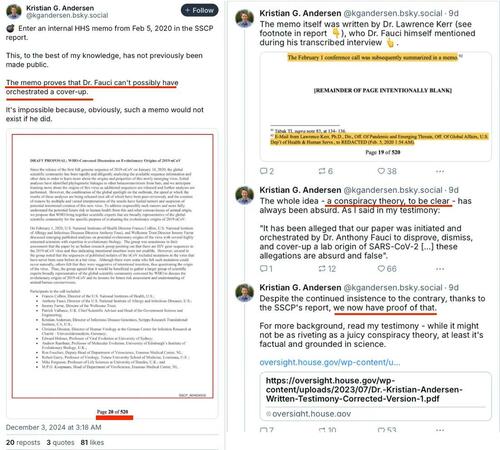Pandemic Coverup Intensifies: Scripps Institute’s Kristian Andersen Cannot Tell The Truth
Authored by former lead Senate investigator Paul D. Thacker via The Disinformation Chronicle,
The House Select Subcommittee on the Coronavirus Pandemic released their final report earlier this month, concluding that the National Institutes of Health’s (NIH) Tony Fauci funded gain-of-function research at the Wuhan Institute of Virology, where a lab accident likely started the initial outbreak.
Multiple U.S. agencies aided by virologist sought to cover-up this evidence, the Select Subcommittee charged, and several people broke the law by misleading congressional staff including Peter Daszak of EcoHealth, who funded gain-of-function research at the Wuhan lab; NIH employee David Morens who served as Tony Fauci’s advisor; and former New York Governor Cuomo who lied about nursing home fatalities in his state.
The Select Subcommittee’s report will likely serve as roadmap for incoming Trump officials seeking to clean up federal research. However, Scripps researcher Kristian Andersen sought to invert the report’s findings, posting a series of false allegations about the report’s conclusions on Bluesky a social media app popular with Democrats fleeing X. Andersen was previously caught misleading Congress by myself and Ryan Grim at The Intercept, and his latest actions pile on the evidence that the Scripps scientist cannot tell the truth and lacks even a mob lawyer’s fleeting interest in candor.
Follow the Documents
Andersen, a virologist at the Scripps Research Institute in La Jolla, California, emerged as a controversial researcher early in the pandemic, and has been one of the most outspoken cheerleaders for the theory that pandemic started with a natural spillover from an animal to humans outside of a lab. But emails released a year after the pandemic’s beginning showed that Andersen initially thought the virus had been genetically engineered. However, after a phone call with Fauci and another major virology funder, Jeremy Farrar, then with the Wellcome Trust, Andersen reversed course.
Along with other virologists funded by Fauci and Farrar, Andersen then published a March 2020 Nature Medicine paper called “Proximal Origins” which concluded a Wuhan lab accident was not “plausible.” The Nature Medicine paper thus diverted any blame from Fauci for possibly starting the pandemic, as he was funding that same lab in Wuhan. Emails later showed that Fauci and Farrar helped guide the Nature Medicine piece to publication, a fact which Andersen continues to deny.
Emails and other private messages released in the summer of 2023 by Congress also indicated that Andersen’s co-authors on the Nature Medicine paper may have put politics before science.
“[G]iven the shit show that would happen if anyone serious accused the Chinese of even accidental release, my feeling is we should say that given there is no evidence of a specifically engineered virus, we cannot possibly distinguish between natural evolution and escape so we are content with ascribing it to [a] natural process,” Andersen’s colleague, Dr. Andrew Rambaut, wrote to a group of virologists over Slack in February 2020.
“Yup, I totally agree that that’s a very reasonable conclusion. Although I hate when politics is injected into science – but it’s impossible not to, especially given the circumstances,” Andersen replied.
Andersen did not return a request to explain his false statements, nor provide an explanation for who paid his lawyer when he appeared before the Committee.
Follow My Lies on BlueSky
Continuing his political campaign to deny a possible lab accident, Andersen posted excerpts of the House final report on Bluesky. In particular, Andersen posted a screenshot of a memo found on page 20 of the Select Subcommittee report. “This memo proves that Dr. Fauci can’t possibly have orchestrated a cover-up,” Andersen wrote. Andersen then repeated the dishonest claim that the memo is proof that Fauci had no involvement in directing the Nature Medicine paper, despite emails to the contrary.
In a later Bluesky post, Andersen charges that these emails are “a conspiracy theory, to be clear.” But Andersen’s Bluesky posts omit one small detail about this memo found on page 20—the report’s next page, page 21.
On the following page of the report, investigators note that Andersen testified that Fauci had suggested that he write a peer-reviewed paper (this is the Nature Medicine, Proximal Origins paper) on the possibility of a lab accident at Wuhan. Page 21 also reveals that Andersen emailed to Nature that Fauci and others “prompted” the paper:
When Dr. Andersen presented a draft of Proximal Origin to Nature, he stated it was “prompted” by Dr. Fauci and later stated the goal of Proximal Origin was to “disprove the lab leak theory.”
Here’s the report’s page 21 that Andersen failed to post on Bluesky.
And here’s the email Andersen wrote to Nature Medicine, where he explained that the Nature Medicine Proximal Origins paper was “prompted by Jeremy Farrar, Tony Fauci, and Francis Collins.”
To be clear, nothing is stopping Andersen from lying to his followers on Bluesky. He can continue posting truncated portions of the report to falsely assert Fauci had no involvement in his Nature Medicine paper. Lying liars lie.
But Andersen also got caught lying to Congress, and that’s where he can run into legal peril. Unlike lying on Bluesky, lying liars can be prosecuted when they lie to Congress.
Will DOJ Prosecute Lying Liars?
To mediate the Select Subcommittee’s demand for answers and to protect him during a deposition and public hearing, Andersen hired criminal defense lawyer, John P. Rowley, a former federal prosecutor who defended Trump before the Department of Justice.
In testimony Andersen submitted for a July 2023 House hearing, he sought to dismiss the emails showing that NIH officials Anthony Fauci and Francis Collins helped to orchestrate his Nature Medicine Proximal Origins paper.
But after Nature Medicine accepted the paper in March 2020, Andersen sent Fauci and Collins the paper’s draft and a draft of the press release. Andersen then thanked them for “advice and leadership” on the matter. “Please let me know if you have any comments, suggestions, or questions about the paper or the press release,” Andersen wrote the two NIH officials who funded his research.
“Nice job on the paper,” Fauci replied.
But in his July 2023 testimony, Andersen alleged that Fauci had not provided “advice and leadership” on the paper. Instead, Andersend proclaimed some monumental difference between asking someone to comment or offer suggestions about a paper instead of on a paper.
“Note, that I say ‘about the paper’, not e.g., ‘on the paper,’” Andersen testified.
Andersen sought to clarify later in his testimony, “Sending a copy of a paper that has been accepted and is in ‘proof’ (i.e., at a stage where only changes directly requested by the journal can be introduced) is simply a professional courtesy.”
Emails impeach this portion of Andersen’s testimony, as Fauci was provided multiple drafts of the paper. A month before Andersen emailed Fauci and Collins the “proof” of the paper in March 2020, Jeremy Farrar forwarded Fauci a “rough first draft” from Andersen’s co-author Edward “Eddie” Holmes.
“Please treat in confidence—a very rough first draft from Eddie and team—they will send on the edited, cleaner version later,” Farrar emailed Fauci and Collins. The following day, Farrar emailed Fauci and Collins, “Tony and Francis, The revised draft from Eddie, copied here.”
Much of the structure and footnotes are the same of this “rough first draft” and some phrases appear verbatim in the article Nature Medicine later published. Here are a few passages for comparison.
If this is not enough, one more bit to chew on. Andersen stated in his July 2023 testimony that Fauci had received the final “proof” of the article as “simply a professional courtesy.” But we know this is not true. Some months after Andersen’s congressional testimony Fauci testified that he had been sent multiple drafts.
Here’s Fauci discussing Andersen’s Nature Medicine paper starting on day 2, page 71 of his sworn deposition:
Q As the minority said, we’ve talked to all the U.S.-based authors or those who are acknowledged on that paper, so I won’t go through all of the science in it, except for I want — you were sent drafts periodically?
A Right.
Q A couple. I think it was less than 10, more than 5, drafts —
A Right.
Fauci’s January 2024 deposition impeaches Andersen’s July 2023 statement before Congress.
But it doesn’t end there. After Andersen was caught lying in his July 2023 congressional testimony, The Intercept published an expose a few days after, noting Andersen had also lied to Congress about his NIH funding from Fauci.
During the 2023 hearing, The Intercept discovered, Andersen sought to distract Members of Congress about a serious conflict of interest. While writing the Nature Medicine paper, whose conclusions diverted any blame from Fauci for funding research in the Wuhan lab, Andersen was awaiting Fauci’s approval for a major grant.
Kristian Andersen of Scripps Research, who testified at the hearing along with Bob Garry of Tulane University, preempted the charge in his opening statement, telling the committee he had no live fundraising requests before Fauci’s agency at the time of the call. “There is no connection between the grant and the conclusions we reached about the origins of the pandemic. We applied for this grant in June 2019, and it was scored and reviewed by independent experts in November 2019,” Andersen testified. “Based on the actual timeline of this grant, it is not possible that the merit-based federal grant awarding process was influenced by a call in February, 2020.”
But Andersen’s testimony was false, The Intercept reported. While Andersen’s grant had been reviewed, it was still waiting for Fauci’s final approval and signature.
The grant wasn’t finalized until May 21, 2020. In other words, it was on Fauci’s desk at the time of the conference call. Andersen’s lab announced the funding in a press release in August 2020, nine months after he claimed it was already finalized. The press release describes it as a “new $8.9 million grant.”
In case you’re still not certain if Andersen is a liar, The Intercept posted a screenshot of Andersen’s grant, showing that Fauci had given final approval on May 21, 2020.
Congress is far from finished with addressing all the problems that happened during the pandemic. Just last week, the Senate Committee on Homeland Security and Government Affairs (HSGAC) sent letters to a dozen federal agencies, demanding they preserve documents pertaining to Covid’s origins.
More to come…
Subscribe to The Disinformation Chronicle here…
Tyler Durden
Thu, 12/19/2024 – 20:05
via ZeroHedge News https://ift.tt/SoLpYRm Tyler Durden





















